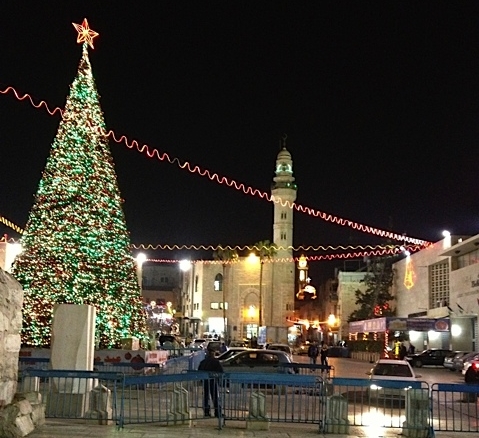Muslim Perspectives on "Remembering God" at Christmas
What Muslims think about Christmas
 To get some sense of what Muslims think about Christmas, I decided to poll a cross-section of my Muslim friends and colleagues.
To get some sense of what Muslims think about Christmas, I decided to poll a cross-section of my Muslim friends and colleagues.
A Muslim from India alluded to the stories of the angel's visit to Mary and the birth of Jesus which appear in both the Qur'an and the New Testament. "The story, the characters, and the spirit they evoke serve as a reminder of God's miracles and messages." This Indian Muslim also expressed deep respect for the season as "a time of festivities which include beautiful ways of prayer, music, lights, food, and lots of happy faces" and which invites us to "celebrate our unity in the face of all our differences."
Another Muslim, a Palestinian American, also spoke of Christmas as a time which shouldremind all people of "the blessings and miracles that God bestowed on Jesus...as well as the common love of God and love of humanity which our beliefs teach us regarding his ministry and message."
A Muslim professor, who regularly preaches at some of the largest mosques in the Greater Chicago Area, underscored the imperative in the Qur’an for the faithful to take every opportunity to "remember God, especially by remembering God's chosen people, such as Abraham, Moses, Job, Jesus, and Mary." Therefore remembrance of Jesus and Mary at Christmas time, he went on to say, "can be a meritorious act [for Muslims]—if it remains within the boundaries of Islam"—meaning that it doesn’t incorporate Christian beliefs and practices incompatible with Islamic norms.
And finally, an African American Muslim colleague of national and international renown simply said: "When I think of Christmas, I think of a combination of some who increase their good works, and others who just spend on themselves."
A theme runs through many of the responses I received: remembrance.
For those who know something about Islam, this will come as no surprise since the Qur'an teaches quite plainly that the lynchpin of a life of taqwa or "God-consciousness" is dhikr Allah or the "remembrance of God."
To be a person of faith is to live life as one seamless act of “remembrance”—in other words, as one seamless act of prayer and thanksgiving to the one God.
A life lived as prayer must be, like the Muslim salat (obligatory prayer), radically holistic, encompassing one’s mind, heart, and body—one’s thoughts, feelings and actions.
And as my African American colleague underscored: one cannot propose to remember God at Christmas—or any other time—if one forgets and does not act upon God's unqualified demand for the justice due the poor and oppressed.
In December 2000, just before the turn of the millennium, Christianity's observance of the revelation of God's Word to the world in the person of Jesus Christ on December 25—namely, Christmas—converged with Islam's observance of the revelation of God's Word in the Holy Qur'an to the Prophet Muhammad on the 'Night of Destiny'—namely, Laylat al-Qadr.
Some took note. A few talked about the rarity of this once-in-three-decades convergence. Others wondered whether this rare coming together of dates could lead us into deeper reflection about the spiritual interdependence of the meaning of our respective religious observances.
But what might such a spiritual interdependence look like?
Christianity and Islam agree that the coming of God's Word in Christ and the Qur'an, respectively, are not mere mythic events to be commemorated, but rather constitute a challenge to be embraced and lived into.
The challenge is to heed God's Word which calls us to work tirelessly, and in radical love, for the realization of justice and the integrated wholeness of all creation known in the Bible as shalom and in the Qur'an as salam.
Embracing this challenge means a jihad or struggle to live righteously for Muslims, and a decision to embrace God's will even if it entails great sacrifice—a Gethsemane—for Christians.
Because Ramandan's once-yearly, month-long dawn-to-sunset fast is designed to remind Muslims of God's challenge to live righteously, Muslims might consider viewing Ramadan as a Gethsemane moment for renewing their commitment to sacrifice for the sake of Allah.
And because, as Professor Irfan Omar of Marquette University has pointed out, the standard Arabic New Testament translates the Greek word, agonia, in the Gethsemane scene in Luke 22 such that Jesus is in the depths of his personal "jihad," Christians could begin thinking of Christmas as a time for renewing their commitment to the jihad for justice and peace.
Consider visiting MyJihad.org or tweeting to #MyJihad some of the specifics of what your Christmas jihad will be.
Just a thought.
References and Further Reading:
Irfan, Omar. "Keeping Shari'a and Reclaiming Jihad." Political Theology 12:5 (2011), 706-712. Cf. 1 Corinthians 9:25 where kullu man yujahidu ("everyone who struggles"—often translated as "athletes") is used as the Arabic translation of the Greekagonizomenos.
Cragg, Kenneth. Jesus and the Muslim: an Exploration. London: Oneworld, 1999 (1985).
Hussein, M. Kamel. City of Wrong: a Friday in Jerusalem. Kenneth Cragg, tr. London: Oneworld, 1995 (1959).
Khalidi, Tarif. The Muslim Jesus: Sayings and Stories in Islamic Literature. Cambridge, MA: Harvard University Press, 2003.
Lawson, Todd. The Crucifixion and the Qur’an: a Study in the History of Muslim Thought. London: Oneworld, 2009.
Woodbury, J. Dudley. “The Muslim Understanding of Jesus.” Word and World 16:2 (Spring 1996) 173-178. http://wordandworld.luthersem.edu/content/pdfs/16-2_Islam/16-2_Woodberry.pdf.
Photo Credit: Scott C. Alexander
Author, Scott Alexander, (Ph.D. Columbia University) is Associate Professor of Islam and Director of the Catholic-Muslim Studies Program at Catholic Theological Union in Chicago. His latest book project is The Race to Goodness: An End to Triumphalism in Christian-Muslim Relations. He serves on the Board of Trustees of the Marty Center.
Editor, Myriam Renaud, is a Ph.D. Candidate in Theology at the University of Chicago Divinity School. S

